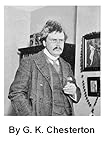 Tremendous Trifles by G.K. Chesterton
Tremendous Trifles by G.K. ChestertonMy rating: 5 of 5 stars
This is simply essential reading for any fan of Chesterton. It's vintage. A collection of essays on all sorts of topics: lying in bed, forgetting white chalk, being expelled from a Hansom Cab against his will, Picking his own pockets, robbing a French restauranteur, and all sorts of typical Chesterton absent-minded brilliance. His prose here tends to be more playful than in his fiction, making him the essay writer that is the exception to Lewis' rule in Horse and His Boy.
I still cannot comprehend exactly how he does what he does with words. It isn't forced or strained, as he produced a staggering amount of material, he just sees the world in a wholly different way than anyone else. He knew of his reputation for paradox, but seemed somewhat exasperated by it, as he comments that he isn't the one that made the world stand on its head.
He really is a chap that I would have loved to have met, to have simply followed around, or to have been able to record what his brain did and where his imagination took him in the course of any given hour. As it is, I'm surfacing for air and reminding myself that other authors exist (paltry and pasty beings though they be after the ferocious life and blinding colour of the Fat Catholic), and then I shall dive again when my lungs can sustain me longer. Perhaps one day I shall find--and this is an eternal dream of mine--than not only have I become a good man, but a Chestertonian one: one who knows, loves and lives the absurdities of our Triune God.
View all my reviews
